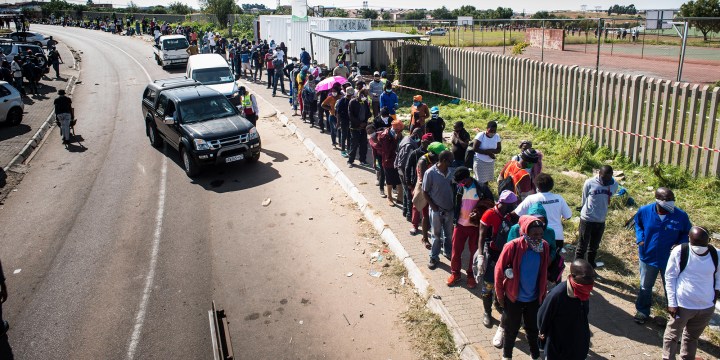FOOD CRISIS
NGO and government collaboration: Deputy minister proposes mapping system for relief packages

In an effort to collaborate with NGOs, the deputy minister in the Presidency, Thembi Siweya, and a few NGOs said that a mapping system for relief packages would be one of the ways government and the civil society sector can work together.
At a virtual meeting on Monday, 29 June, agreements were made that there would be a mapping system between community organisations and government to bolster collaboration between the two in the relief work they are doing.
This came up at the discussion between Thembi Siweya, the deputy minister in the Presidency, and foundations that have been established in honour of liberation stalwarts, such as the Oliver and Adelaide Tambo Foundation, Ahmed Kathrada Foundation and Thabo Mbeki Foundation.
Neeshan Balton, the executive director of the Ahmed Kathrada Foundation, said that they, in collaboration with other organisations, were looking at a mapping system to see which areas had received food relief packages, that the correct recipients had received food packages, what the needs are in various communities and which areas have not been assisted.
Food relief has been government’s biggest weakness, said Balton. He added that in the absence of government stepping in, NGOs were doing the work.
Ntsiki Sisulu from the Walter and Adelaide Foundation said they were distributing food packages as well as masks, sanitisers and soap to communities in need. They were filling in the gaps where government wasn’t distributing, said Sisulu.
Sello Hatang, the CEO of the Nelson Mandela Foundation, said they had been working with other foundations to distribute food parcels.
“We’ve distributed [food parcels] in seven of the nine provinces; we’re left with KZN and the Northern Cape,” said Hatang.
The foundation was also distributing food vouchers and had been in talks with Vodacom about distributing food vouchers straight to people’s cellphones.
With organisations ensuring that communities don’t go hungry during the lockdown, Siweya said it was possible to collaborate on an initiative like the mapping system to ensure that people get their food parcels.
Hatang said it was heartbreaking to see the stigma attached to those who have been infected with Covid-19. Hatang told of a mother in quarantine after testing positive for the coronavirus.
“She’d left behind four small children. When the children came to get food parcels, nobody wanted to get close to them, despite [them] testing negative [for Covid-19]. That’s what we need to deal with,” said Hatang.
“Going forward, we need to look at how we develop a campaign that engages with the stigma of Covid-19. Perhaps we could look at what mechanisms were taken in order to address HIV stigma and we can use that to develop campaigns,” said Zengeziwe Msimang, the CEO of the Oliver and Adelaide Tambo Foundation.
Siweya commended those who’d openly discussed being infected with Covid-19.
“The only way to beat stigma is for us to talk about it and showing that people can be infected and recover from the virus,” said Siweya.
Siweya said it was important to collaborate and work with those who were already working in communities. Balton, however, said government wasn’t serious about collaboration.
“I don’t think that government is serious about collaboration. It’s taken three months to get this kind of initiative going. Various civil society organisations have written to the Presidency requesting a forum to at least engage. I think if there’s one sector that has not yet been met in its entirety it’s civil society,” said Balton.
Balton also said government’s messaging was inconsistent.
“You see mayors and ministers with entourages, there are ministers addressing rallies and they’re not wearing their masks properly. No wonder people aren’t taking it [Covid-19] seriously,” said Balton.
Siweya thanked Balton for “boldly engaging. We weren’t necessarily looking for the foundations to praise us. I agree that as leaders we must take the baton so our people can follow.”
Siweya said she’d review what had been discussed and get in touch with the foundations with a way forward. Siweya committed to having a meeting with broader civil society at a later stage. DM

















 Become an Insider
Become an Insider